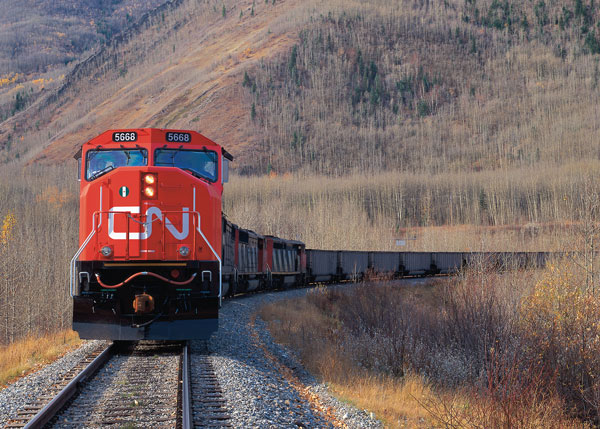
Transport Minister wants CN Rail to testify in Parliament
by Bruce Cheadle, The Canadian Press

There have been three recent CN Rail derailments in northern Ontario, including two along a 40-kilometre stretch of track near Timmins, Ont.
Transport Canada inspectors are on the site of CN’s weekend derailment near Gogama, Ont., and an aerial surveillance team has flown over the scene where oil tank cars crashed and burned, Raitt told the House of Commons transport committee March 10.
In the past month, four trains carrying crude oil have derailed in the United States and Canada, sparking major fires, polluting waterways and forcing evacuations.
There have been three recent CN Rail derailments in northern Ontario, including two along a 40-kilometre stretch of track about an hour south of Timmins, near the village of Gogama.
“We are concerned with the number of derailments that have taken place in this area,” Raitt said.
“We don’t know what caused this derailment yet, but we expect that the company will fully co-operate with the Transportation Safety Board in its investigation.”
She then asked that the committee call CN Rail to testify about the recent derailments.
Opposition MPs on the transport committee questioned whether there are enough government inspectors monitoring rail safety given the exponential growth in oil-by-rail shipments over the past five years.
Under questioning from Hoang Mai, the NDP transport critic, officials said there are now 117 rail safety inspectors on staff—one more than there was in 2013 when an auditor’s report found that the department was not performing enough inspections or safety audits of Canada’s railways.
Liberal MP David McGuinty cited government estimates to show Transport Canada’s budget is shrinking, then asked how many inspectors the government had on staff when it came to power, and how many were added to deal with the oil-by-rail boom.
“We have a very good grasp on what is happening with respect to this (oil) commodity,” said Raitt.
“In 2009 there wasn’t a single barrel that was moving on the rail. Since then we’re at approximately 180,000 tank cars (per year) that are travelling right now.”
But she rejected the notion that more dangerous goods on the rails requires more inspectors, calling it “a false analogy.”
Raitt said railway regulations are set up “and we expect people to follow them.” Inspectors are there to ensure the railways properly self regulate.
The government recently moved to increase the number of on-the-ground inspections and is trying to hire more inspectors and auditors, although staff attrition through retirements and departures is making that a challenge, officials said.
Raitt twice asked that the committee take a closer look at the operations of CN—a suggestion taken up by her parliamentary secretary, who said committee testimony would help establish whether the railway company was co-operating with investigators.
A spokesman for CN, Mark Hallman, said in a telephone interview the railway is fully co-operating and would be happy to appear before parliamentarians in Ottawa.
Meanwhile, CN said a bypass at the Gogama derailment site went into service March 10 and the first train had used it successfully.
Spokesman Jim Feeny said in an email that work will now begin to rebuild the track and bridge destroyed by Saturday’s derailment and fire.
Feeny said a trace of oil product has been detected at the mouth of the local river system and entrance to the lake, and testing is underway to determine how much oil product is present.
